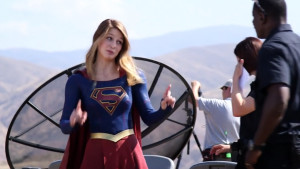
I kept getting goosebumps every time the promo pieces for the new Supergirl show came on TV in the first three weeks of October. The week before the show debuted I told my wife that I simply had to watch it. She gave me a funny look, but didn’t argue. When we finally sat down that first night, I was surprised at how excited I was. And when the moment came for Kara to say, “To hell with trying to hide who I really am,” and she went running through the dark streets of National City, leaping into the air (in fits and starts) until she was soaring through the sky on her way to save a sure-to-crash jet, I burst into tears. Seriously. No shit!
I am a 57-year-old father of three young men. My boys were all stud baseball players from the age of six all the way through high school. One of them is now a minor leaguer in the Phillies organization. I have been a lover of most male-oriented sports all my life. I revere macho writers like Hemingway, Kerouac, Henry Miller, and Charles Bukowski. And I’ve been in love with sexy actresses for as long as I can remember — from Raquel Welch and Jane Fonda back in the 1960s to Sandra Bullock and Jennifer Aniston of today.
So, what the hell is going on with me that I have been so moved by a TV show about a young woman super hero? The dialog is a bit cheesy (on purpose for sure). You can also see plot turns coming a mile away. Kara is confronted with the same romantic dilemma that Katniss Everdeen is faced with in the Hunger Games — two totally handsome, unique, sensitive, brooding dudes who are extremely fond of her. In Kara’s case, it’s a black Jimmy Olsen — totally hot and totally cool — along with a nebbishy sidekick guy named Win Scott (more like the original Jimmy Olsen, to be honest) who openly adores her and is an IT specialist extraordinaire. Both men respect the heck out of Kara, and not just because she’s Supergirl. They see her intelligence, compassion, leadership qualities, and humanity.
Here’s the thing: in our highly cynical, over-mature, stuffed to the gills, cynical media entertainment world, doing a super anything story is to walk all the way to the top of digital universe and know that you’re going to be doing a balancing act between kitsch and dramatic science fiction thriller. Writers, directors, and actors know they have to take characters and plots seriously, but not too seriously. When you go to the top of the symbolic chain you can’t be trying to prove anything or appeal to people’s charitable instincts. More than anything, though, your audience has to be ready for this balancing act. It’s precarious, risky, and inevitably impossible to sustain perfectly. But it’s also fun as hell and meaningful in a very direct way.
In Supergirl’s case, CBS has taken on the responsibility (whether they know it or not) of symbolizing the approach to life young women can now step into with no questions asked. I’m sure I’ll get arguments here about how attractive Melissa Benoist is and that she doesn’t properly represent modern young women in this world, but it’s probably a good idea to let that issue go for now. The dual identity thing — mild mannered, nerd in glasses vs. caped warrior for justice — says a great deal about the super hero body image and sex symbol thing (both with Superman/Clark Kent and Supergirl/Kara Danvers).
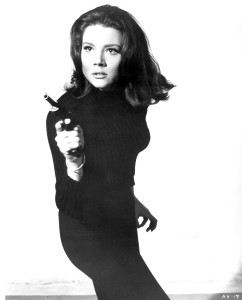
We’ve actually been at it for a long time giving the thumbs up or thumbs down to female characters who are more than just sex symbols and damsels in distress. I think back to my early life being so impressed with Mrs. Peel in The Avengers, and Samantha Stevens of Bewitched, even Julie Andrews as Mary Poppins. They were all strong, independent, moderately flawed women. One was a badass, one a mom and housewife, and one a sort of ultimate babysitter-good-witch with a heart of gold (an angel?). I never saw them as objects of desire. They were just awesome, cool women who knew what they were doing. That was a long time ago. For every Emma Peel there were 20 objectified sex symbols and beautified Maybelline girls.
But something began to happen when the entertainment world moved into the 21st century. I noticed it first when Jennifer Garner showed up in Alias playing Sydney Bristow. Men and women (boys and girls), all fell in love with Sydney in a new way. Something clicked in that show that we hadn’t noticed before — a mixture in one character of radiant beauty, brains, character flaws, compassion — even loneliness.
You can find many lists of “strong female protagonists” online. You can also find lots of feminist criticism of this character category. When we say strong it doesn’t necessarily mean women who can kick ass or kill with impunity — although both Ripley of the Alien movies and Sarah Connor in Terminator were quite inspiring in their day, and helped make Sydney Bristow possible. What we’re talking about is women who are self-empowered and openly able to grapple with moral issues and bad guys simultaneously.
To my mind, the key for modern strong female protagonists has always been whether they are empowered. And there are so many ways to be that kind of a character. Think about Sally Fields in Norma Rae or Julia Roberts in Erin Brockovich. Or think about today’s Mindy Kaling or Kimmy Schmidt — both hilarious, goofy, endearing, independent, and fearless when it counts.
Empowerment has always been a staple of great characters — male and female — in any kind of story. We love Scout in To Kill a Mockingbird because of her moxie and sense of fair play. We love Charlie Chaplin because he is the consummate little guy standing up to the big jerks of the world. And we love Barbara Feldon as Agent 99 in the ’60s farce, Get Smart, because she actually is smart and knows how to handle herself around ruthless bad guys — and Maxwell the idiot.
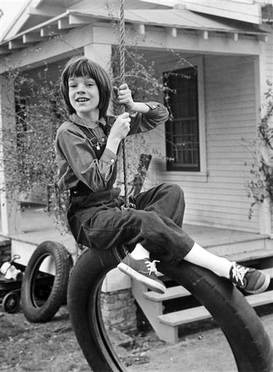
Empowerment is one of the main engines that drives the stories we love. It works because characters get under our skins, allow us to relate to them, but also stand up to authority and social expectations, risk everything for some bigger purpose, act on principle. They are role models. Charlie Chaplin tweaking the nose of power had a huge effect on people back in the early days of movies. So did Mary Poppins simply questioning how the Banks children were being treated by their father (and how he was treating himself). And somehow, I believe, little Scout managed to pry open courage in many white Americans everywhere in the early 1960s to stand against racism and support black Americans in the fight for civil rights.
I want to be clear here. I left super heroes behind in my entertainment life years ago. I’ve never been very impressed with any of the movies that have come out featuring Marvel or DC Comic protagonists — from Batman to Spiderman to all 109 versions of Superman. And yet somehow Supergirl has gotten under my skin. I haven’t missed an episode yet.
It’s obvious a bunch of folks at CBS want to make money off of yet another incarnation of super strong, magical, attractive characters. The super hero story in movie theaters and on TV has more or less been about wish fulfillment for male viewers for almost ever. Could CBS yank in the other half of the potential audience? Were they making a bid to compete with Netflix’s Jessica Jones which debuted about a month after Supergirl? Certainly they knew that Wonder Woman was going to show up on the big screen in Batman v Superman: Dawn of Justice (summer 2016), and then have her very own event in 2017. But there’s surely more to this story than trying to capture eyeballs in order to make money.
This one is different. In the pilot’s opening sequence, Kara walks through busy streets saying “I’m sorry” to people who bump into her, feeling insecure about herself, and frustrated by life in the big city. She’s unsure of herself at work and belittled by her boss, media magnate Cat Grant (an over-the-top Calista Flockhart). She has sworn not to use her powers. Her lot in life is to fit in and get along with everyone. She’s the personal assistant to a boss from hell for goodness sake. But her adopted sister is on a plane. Flight 237. Kara is at a bar on a date with a jerk who bails on her — presumably because she’s dweeby. She sees on TV, though, that Flight 237 is in trouble. An engine is on fire. The plane is going to crash. No time to waste. She runs outside and does a scampering routine in order to fly. Does she save the day? Save her sister? Does she reveal herself to the world? What do you think?
So, yes, of course I burst into tears watching her save that plane. And I clapped and cheered (seriously!) when she used her heat vision to destroy the first of what will be many alien convict villains in the show, all after a nasty, nail-biting rock ’em sock ’em WWE-type fight. I began to blubber as well when to prove she was “her” to Win, Kara fell backwards off their office building roof then zoomed skyward. As her friend stared in disbelief, I clapped and cheered again, happy — ecstatic even — that Supergirl was getting her secret out into the open in episode #1, sharing it with a friend (in fact, a number of supporting characters know she is “her”). One of the things I always hated about the standard super hero meme when I was growing up was the secrecy and the near complete alienation forced on guys like Clark Kent and Peter Parker.
In a weird way this show is a penultimate moment in the somewhat bizarre world of feminist change that has seeped into almost every aspect of our lives over the last fifty years or so. I say bizarre world only because as a supportive outsider who believes in women’s equality (and even their superiority), during the past decade or so feminism has become quite confusing. But if you look at our culture and what has happened to women and how they don’t just have a “place” anymore, but are, in fact, riding herd over so much just as well as their guy counterparts, you see (I do, at least) that we are arriving at a new and hopefully desirable moment in our country’s history — however you define this idea called “feminism.”
What I see is that there’s the potential for a supergirl in every young woman growing up today. Kara Danvers is athletic, coordinated, muscular, and has a fighter’s heart when she needs one. She’s also positive about everyone and everything around her. She’s inspiring, nerdy, surprised by her own heroic deeds, optimistic, smart, determined — and yet still vulnerable and imperfect.
The joy on Kara’s face when she sees TV footage of herself rescuing her sister’s plane is the joy of every young woman seeing that she is being acknowledged for her strength and courage and intelligence in the real world — not her sex appeal, acquiescence, or amorphous ladylike qualities.
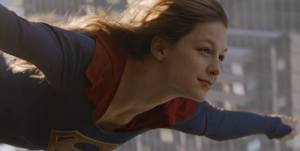
Is this a feminist TV show? I don’t know. Maybe it depends on your definition of feminism. I was raised by a feminist in the 1960s and 1970s. She’s no longer in this world, but I think she’d enjoy Kara’s story — but not because of what it says to her about being a woman. She’d enjoy it for what it says to girls — especially pre-teens — about what may well be inside them if they can just find it.
But I think my mom would also see what Supergirl is saying to boys: “Girls are more than just your equal, they’re capable of being super-powered. And that’s okay. In fact that’s amazingly awesome.”
“Forget whether Kara is going to choose Jimmy Olsen or Win Scott, maybe she’ll choose to be friends with you. Imagine that!”
Nope. I wasn’t all teary because I’m in love with Melissa Benoist and think she’s hot in her tight leotard costume and thigh-high boots. I was teary because I want young women to have role models that are super positive and super optimistic. With room to dream. And open-ended enough to allow girls to be as creative as they want in how they grow up in the America of the future, and how they live in the world today.
A slightly revised version of this post may be found at Medium.com.






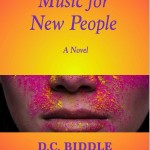
[…] Sounds Like a Job for Supergirl: Empowered Girls and Women in the 21st Century […]
[…] Sounds Like a Job for Supergirl: Empowered Girls and Women in the 21st Century […]